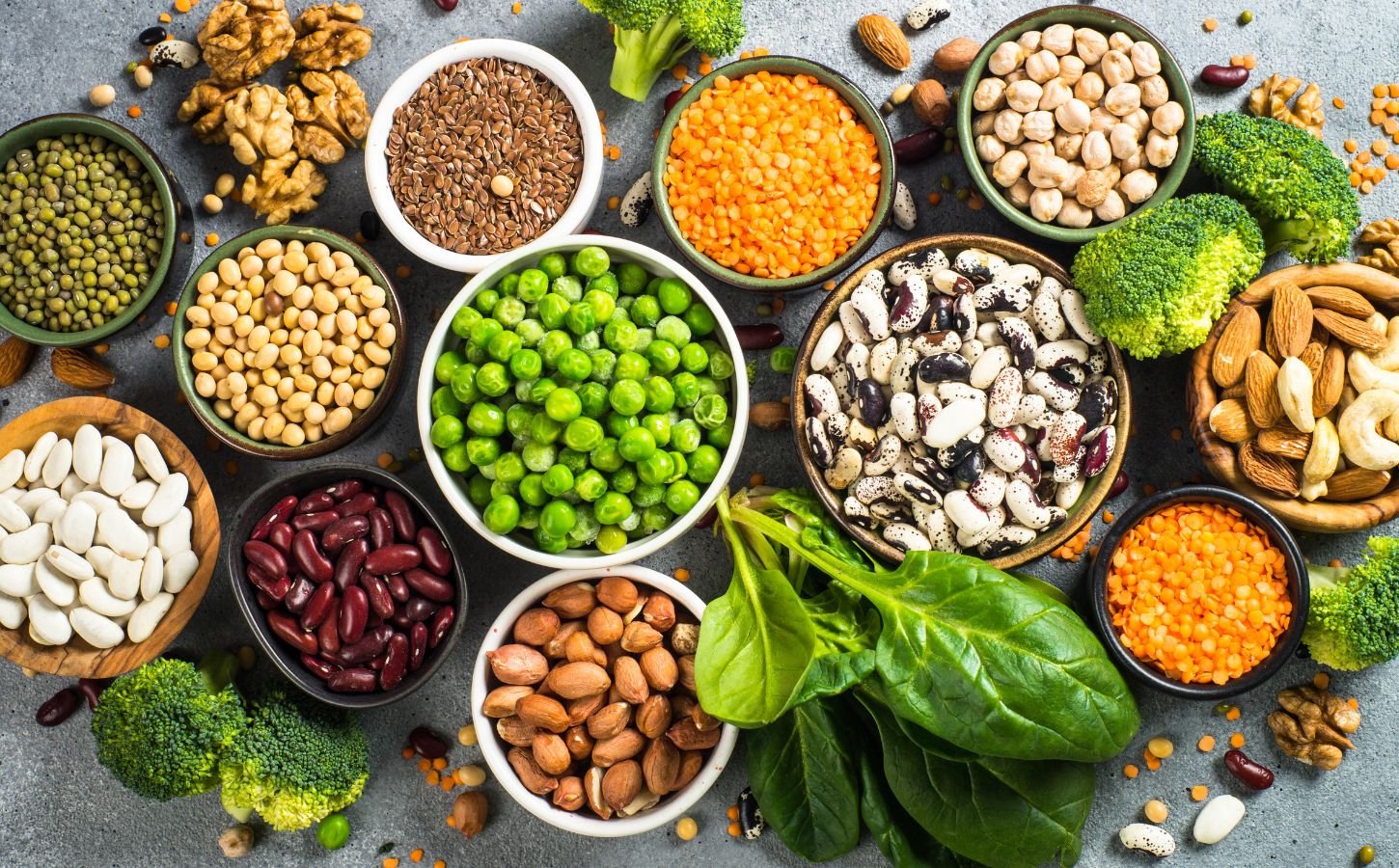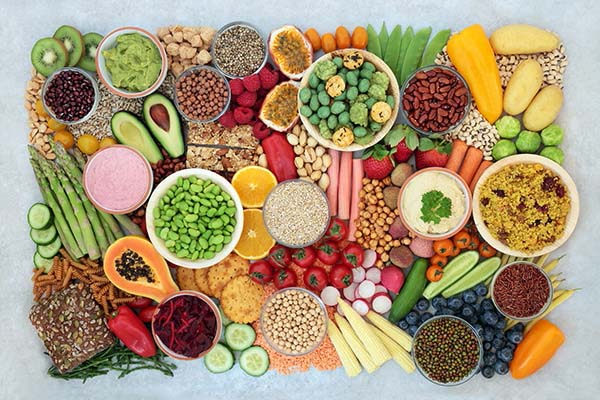How Gluten Free BBQ Sauce Elevates Your Vegan Grilling Game
Wiki Article
All About Healthy Food: Advantages of Embracing Plant Based Choices
The conversation bordering plant-based diet regimens has actually gained significant attention in the last few years. Lots of people are discovering the possible health and wellness benefits, nutritional benefits, and ecological effects connected with these dietary choices. As individuals come to be a lot more conscious of their food's influence on well-being and sustainability, questions emerge about the usefulness of taking on such a way of living. What specific changes can one anticipate, and just how might these options improve not just personal wellness however also the world's future?Understanding Plant-Based Diet Plans
Several people link plant-based diet plans mainly with vegetarianism or veganism, these diet regimens can encompass a vast array of consuming patterns that prioritize entire, minimally refined plant foods. Such diet regimens often consist of fruits, veggies, whole grains, nuts, seeds, and beans, while restricting or getting rid of pet items. This flexibility enables people to tailor their nutritional selections according to personal preferences and dietary demands. Some may adopt a mostly plant-based diet while still sometimes consuming meat or milk, frequently described as a flexitarian strategy. The focus remains on integrating even more plant foods, which can lead to a diverse range of tastes and meals. Understanding these different analyses of plant-based consuming is essential for appreciating its availability and allure in modern food society.Wellness Benefits of Plant-Based Foods
The health benefits of plant-based foods are considerable, using a nutrient thickness benefit that sustains general health. Study shows that these foods can boost heart wellness and play an important role in efficient weight administration. By integrating much more plant-based choices, individuals may enhance their dietary choices and advertise lasting wellness.Nutrient Thickness Benefit
Nutrient density plays a vital function in the health benefits of plant-based foods, making them an engaging selection for those looking for a balanced diet regimen. Plant-based foods, such as fruits, veggies, beans, nuts, and entire grains, are typically rich in vital vitamins, minerals, and antioxidants while being reduced in calories. This high nutrient thickness enables individuals to eat less calories while still satisfying their dietary demands. In addition, these foods are packed with dietary fiber, promoting gastrointestinal health and aiding in weight monitoring. By integrating nutrient-dense plant-based options, customers can boost their general health, sustain their immune systems, and reduce the threat of chronic diseases. Inevitably, the nutrient density of plant-based foods underscores their value in a health-conscious way of life.Heart Health Renovation

Weight Administration Assistance
Along with promoting heart health, a plant-based diet plan can substantially help in weight management. This nutritional approach stresses whole foods such as fruits, veggies, legumes, nuts, and entire grains, which are usually lower in calories and greater in fiber compared to animal-based items. The high fiber content assists increase satiety, lowering overall calorie consumption. Plant-based diets are commonly abundant in vital nutrients while reduced in harmful fats, making it simpler to preserve a healthy and balanced weight. Research suggests that individuals that take on a plant-based lifestyle have a tendency to have reduced body mass indexes (BMIs) and experience even more effective weight reduction contrasted to those that eat meat-heavy diets. Welcoming plant-based alternatives is a strategic choice for effective weight management.
Nutritional Value of Plant-Based Components
Plant-based components are abundant in necessary nutrients, supplying a varied selection of vitamins, minerals, and antioxidants that add to overall health. A comparison of protein sources reveals that while animal products are often seen as exceptional, numerous plant-based choices offer sufficient protein and other valuable substances. Recognizing the dietary value of these components can help individuals make educated nutritional options.Vital Nutrients in Plants
Nutrient-rich components discovered in plants provide a diverse array of crucial nutrients that add considerably to general health. These active ingredients are abundant in vitamins A, C, and K, which support immune feature, vision, and blood clot, respectively. Furthermore, plants give crucial minerals such as potassium, calcium, and magnesium, essential for heart wellness, muscle mass function, and bone toughness. The existence of fiber in plant-based foods help digestion and advertises a healthy and balanced gut microbiome. Anti-oxidants, found perfectly in fruits and vegetables, assistance fight oxidative anxiety and reduce swelling. Numerous plant foods are reduced in calories yet high in nutrients, making them an outstanding selection for those seeking to preserve a healthy and balanced weight while making certain perfect nutrient consumption.
Comparing Healthy Protein Resources
Protein sources differ substantially in their dietary profiles, with plant-based ingredients using distinct advantages. Unlike pet healthy proteins, which typically include saturated fats and cholesterol, plant healthy proteins have a tendency to be lower in these harmful parts. Legumes, nuts, seeds, and whole grains are abundant in necessary amino acids, fiber, vitamins, and minerals. For circumstances, lentils offer high healthy protein material alongside substantial iron and folate, while quinoa is a total protein, supplying all nine essential amino acids. Furthermore, plant-based proteins are commonly accompanied by anti-oxidants and phytochemicals that support total health and wellness. The change to plant-based protein resources not only improves dietary intake yet also straightens with sustainable nutritional techniques, minimizing ecological effect and advertising long-term health and wellness advantages.Environmental Effect of Plant-Based Consuming
As awareness of environment change grows, lots of people are discovering sustainable nutritional choices weblink that can significantly decrease their environmental footprint. Plant-based consuming has actually emerged as a considerable factor to reducing greenhouse gas discharges, which are largely connected with livestock manufacturing. The growing of fruits, veggies, grains, and beans normally requires fewer resources, such as water and land, compared to animal farming. Furthermore, plant-based diet regimens can bring about decreased deforestation, as less land is needed for grazing livestock or growing animal feed. By shifting towards plant-based choices, consumers can support biodiversity and promote healthier environments. Generally, welcoming plant-based consuming not just advantages individual health and wellness however likewise represents a crucial step toward environmental sustainability and conservation efforts.Overcoming Common Misconceptions
While several people identify the advantages of a plant-based diet plan, a number of mistaken beliefs commonly prevent them from completely accepting this way of life. A common idea is that plant-based diet regimens lack sufficient healthy protein; nonetheless, many plant sources, such as legumes, nuts, and tofu, provide enough healthy protein. Furthermore, some presume that this diet is expensive, when in reality, staples like beans, rice, and seasonal veggies can be rather budget-friendly. One more misconception is that plant-based consuming is excessively restrictive, whereas it in fact uses a diverse range of foods and tastes. Several fret that a plant-based diet might lead to deficiencies, yet with appropriate preparation, individuals can get all required nutrients, consisting of vitamins and minerals, while appreciating a broad variety of tasty dishes. Broad Tips for Transitioning to a Plant-Based Way of living Making the shift to a plant-based way of life can be an enriching experience, though it commonly requires some support to browse the initial modifications. Initially, individuals are motivated to begin gradually, integrating even more fruits, vegetables, vegetables, and entire grains right into their meals while minimizing meat and milk consumption. Meal preparation is important; preparing a regular food selection can aid ease the modification and stop final harmful choices. Exploring new dishes and cooking techniques can also improve the experience and preserve exhilaration concerning plant-based consuming. In addition, signing up with support system or areas can provide motivation and share valuable tips. Finally, staying informed about nutrition guarantees well balanced dishes, protecting against shortages while cultivating a healthy and balanced, enjoyable plant-based way of living.Delicious Plant-Based Dish Concepts
Exploring tasty plant-based dish concepts can inspire individuals to welcome an extra nutritious diet plan. One preferred option is a hearty quinoa salad, including cherry tomatoes, cucumber, and a zesty lemon-tahini dressing. One more fave is a full-flavored lentil stew, packed with carrots, celery, and aromatic natural herbs, best for a comforting dinner. For breakfast, over night oats made with almond milk, chia seeds, and covered with fresh berries offer a healthy beginning to the day. In addition, a vibrant vegetable stir-fry with tofu and a range of vibrant veggies can be a fast yet pleasing dish. Velvety avocado toast on whole-grain bread, sprinkled with seeds and flavors, provides a basic yet delicious treat. These dishes showcase the range and richness of plant-based eating.
Regularly Asked Concerns
Can a Plant-Based Diet Give Sufficient Protein?
The inquiry of whether a plant-based diet can give adequate protein prevails. Various resources, including beans, nuts, seeds, and whole grains, can meet protein requires effectively, supporting a balanced and nourishing diet for individuals.Are Plant-Based Diet Plans Ideal for Kid?
The viability of plant-based diet plans for youngsters depends upon mindful planning. Ample nutrients must be assured, including vitamins, minerals, and article source healthy proteins. With appropriate guidance, such diet plans can sustain healthy and balanced development and growth in youngsters.Just how Do I Eat Out on a Plant-Based Diet regimen?
Eating in restaurants on a plant-based diet involves seeking dining establishments with diverse food selections, requesting alterations, and exploring vegan-friendly options. Preparation ahead and interacting nutritional choices can enhance the dining experience while preserving dietary choices.What Are Typical Irritants in Plant-Based Foods?
Usual irritants in plant-based foods include soy, gluten, nuts, and seeds - Gluten Free BBQ Sauce. People following a plant-based diet ought to understand these irritants and review tags carefully to avoid unfavorable reactions and ensure risk-free usageCan Plant-Based Diets Aid With Weight Loss?
Research indicates that adopting a plant-based diet may facilitate weight reduction due to its usually lower calorie density and higher fiber content. This combination can enhance satiation, aiding people handle their caloric intake effectively. Many individuals link plant-based diet regimens generally with vegetarianism or veganism, these diet plans can include a broad range of consuming patterns that focus on whole, minimally processed plant foods. Nutrient thickness plays a crucial duty in the wellness benefits of plant-based foods, making them a compelling selection for those looking for a balanced diet. Plant-based diet regimens have actually been shown to considerably improve heart wellness, as they commonly include elements that sustain cardiovascular feature. In enhancement to site here advertising heart health and wellness, a plant-based diet regimen can substantially help in weight monitoring. An usual belief is that plant-based diets do not have sufficient healthy protein; nevertheless, numerous plant resources, such as legumes, nuts, and tofu, give adequate protein.Report this wiki page